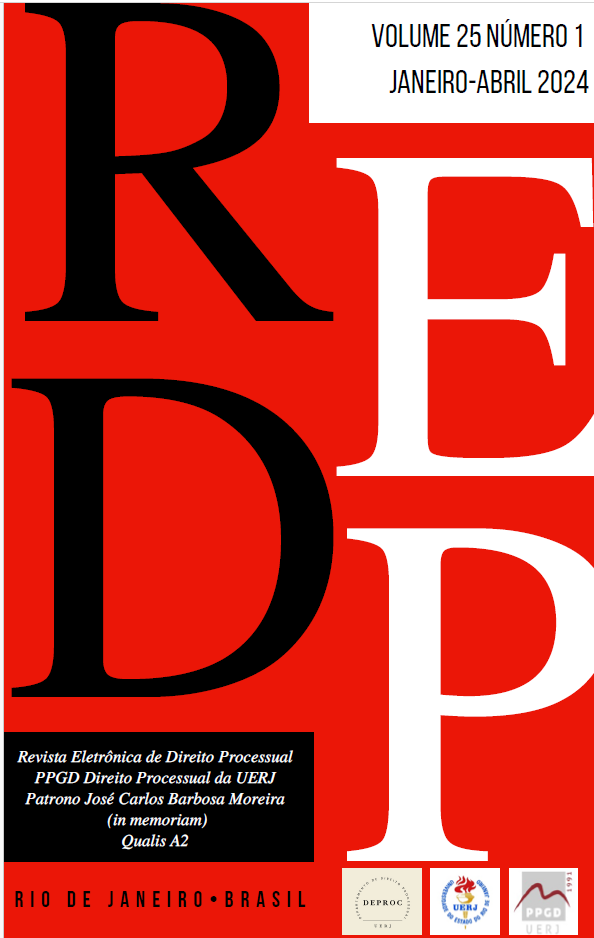O PROCESSO COMO GARANTIA E A IDEIA DE UM CÓDIGO DE PROCESSO CONSTITUCIONAL: UM LIMITE À CATIMBA?
DOI:
https://doi.org/10.12957/redp.2024.81917Resumo
Este artigo tem parte do diagnóstico de Rubens Glezer sobre o comportamento do Supremo Tribunal Federal nos últimos anos, notadamente da prática da chamada catimba constitucional. Na esteira da notícia sobre a abertura das discussões pré-legislativas para a construção do texto de um eventual Código de Processo Constitucional, este trabalho analisa o conceito de processo como garantia e oferece, como limite à catimba constitucional, a sugestão de se pensar o texto da nova lei em consonância com a previsão constitucional de processo como garantia do jurisdicionado, superando-se a noção de processo como instrumento da jurisdição e suas variáveis. A preocupação com o estabelecimento de limites à catimba constitucional é decorrência do fortalecimento do Supremo Tribunal Federal e da necessidade de conferir a esse importante órgão jurisdicional a legitimidade para a atividade que lhe compete na distribuição das funções estatais, notadamente a partir dos ataques que vem sofrendo o tribunal nos últimos tempos e que minam, no limite, o senso democrático do país. Não se pode cogitar de um código processual que implique aumento do âmbito de discricionariedade do poder jurisdicional do STF. Isso porque o estabelecimento desses limites vai servir para devolver ao tribunal a legitimidade democrática de que ele necessita para sobreviver e, com ele, fazer sobreviver o Estado Democrático de Direito. Em um ambiente político hostil como o que se apresenta atualmente no Brasil, a existência de uma corte constitucional que detenha legitimidade democrática é fundamental e, para isso, é necessária a adoção de uma série de medidas, dentre elas, a compreensão de que o processo não serve ao poder jurisdicional e, sim, que este é definitivamente limitado por aquele. O método de pesquisa usado foi o dedutivo, partindo-se do diálogo com as noções de catimba constitucional de Rubens Glezer, passando pela discussão sobre a ideia de processo como garantia, em contraposição à teoria instrumentalista do processo, que é predominante no Brasil, para que se pudesse concluir que compreender o processo como garantia é o primeiro passo para a elaboração de um Código de Processo Constitucional que, de fato, estabeleça claros limites à atividade do Supremo Tribunal Federal. Realizou-se pesquisa bibliográfica e documental.
Downloads
Publicado
Como Citar
Edição
Seção
Licença
Copyright (c) 2024 Renê Francisco Hellman

Este trabalho está licenciado sob uma licença Creative Commons Attribution 4.0 International License.
Todos os artigos publicados na Revista Eletrônica de Direito Processual (REDP) (Departamento de Direito Processual, Universidade do Estado do Rio de Janeiro, Brasil) são licenciados por meio de uma Licença Creative Commons - Atribuição 4.0 Internacional (CC BY 4.0).
Os autores retêm os direitos autorais de seu artigo e concordam em licenciar seu trabalho com a licença CC BY 4.0, aceitando assim os termos e condições específicos desta licença disponíveis no seguinte website: https://creativecommons.org/licenses/by/4.0/legalcode.
- Os autores concedem à REDP o direito de primeira publicação, de se identificar como publicadora original do trabalho e concedem à revista uma licença de direitos não exclusivos para utilizar o trabalho das seguintes formas: Reproduzir, vender e distribuir cópias eletrônicas ou impressas do manuscrito como um todo, de partes específicas do manuscrito e de suas traduções para qualquer idioma;
- O uso do artigo por terceiros é livre, contanto que a integridade da publicação seja mantida e seus autores originais, periódico de primeira publicação e detalhes de citação sejam identificados.
Dentro dos termos da licença, os autores podem entrar em acordos contratuais adicionais separados para a distribuição não exclusiva da versão publicada do trabalho na revista.
Copyright and Licensing
All articles published in the Procedural Law Electronic Review (REDP) (Department of Procedural Law, State University of Rio de Janeiro, Brazil) are licensed under a Creative Commons License - Attribution 4.0 International (CC BY 4.0).
- Authors retain copyright to their article and agree to license their work under the CC BY 4.0 license, thereby accepting the specific terms and conditions of this license available at the following website: https://creativecommons.org/licenses/by/4.0/ legal code.
- Authors grant REDP the right of first publication, to identify itself as the original publisher of the work, and grant the journal a non-exclusive license to use the work in the following ways: Reproduce, sell and distribute electronic or printed copies of the manuscript as a whole, of specific parts of the manuscript and its translations into any language;
- Use of the article by third parties is free, as long as the integrity of the publication is maintained and its original authors, first publication journal, and citation details are identified.
Within the terms of the license, authors may enter into separate additional contractual agreements for the non-exclusive distribution of the published version of the work in the journal.




